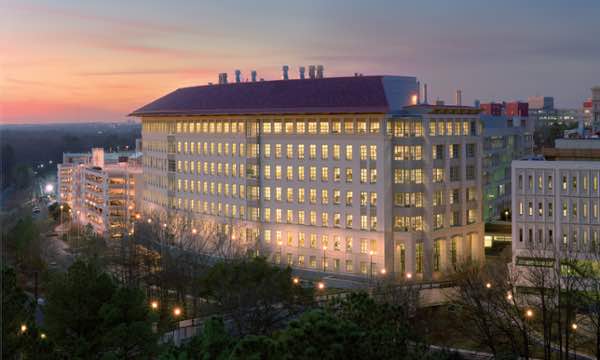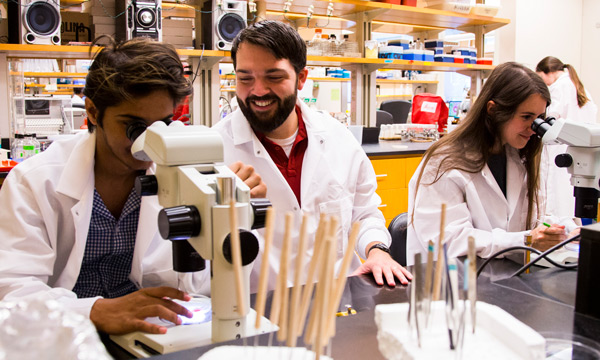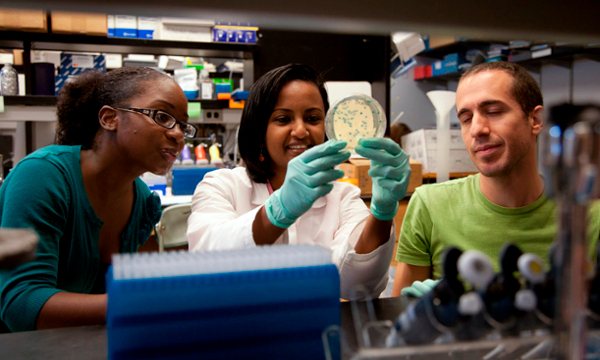Fikri Avci, PhD
 |
(he/him) |
Associate Professor, Department of Biochemistry, School of Medicine
Graduate Programs
- Full Member - Biochemistry, Cell and Developmental Biology
- Full Member - Immunology and Molecular Pathogenesis
Education
PhD, Rensselaer Polytechnic Institute, 2005BS, Istanbul University, 2001
Contact Information
Email: favci@emory.edu
Phone: 404-712-9927
Address:
O. Wayne Rollins Research Center, Room 4113
1510 Clifton Road NE
Atlanta, GA 30322
I joined the faculty at Emory University School of Medicine on July 1st, 2022. Before that, I worked as an Assistant Professor (2013 – 2019) and Associate Professor (2019 – 2022) in the Department of Biochemistry and Molecular Biology at the University of Georgia. In the past nine years as a principal investigator, I have established a highly productive and interdisciplinary research group addressing problems at the interface of immunology and glycobiology. My postdoctoral studies laid the foundation for my independent research program addressing questions on immune interactions of carbohydrate antigens in health and disease. As part of my postdoctoral work (Avci et al., Nature Medicine, 2011; Avci et al., Nature Protocols, 2012), my colleagues and I described the molecular and cellular mechanisms for T-cell recruitment by glycoconjugate vaccines. This work has been highlighted in various print and online media and has had direct and indirect impacts on novel strategies for vaccine development. While the strength of my research group has been rooted in exploring mechanisms of effector immune responses induced by bacterial and viral pathogens through their known and novel surface glycoconjugates, in the past five years, we have made significant progress in our cancer immunology and immunoregulation through gut microbiome research projects.
Our research has direct relevance to the design of a new generation of vaccines against devasting pathogens. In one study, we identified new T cell-specific immune mechanisms induced by HIV envelope glycoprotein, which offered a foundation for developing a protective AIDS vaccine (Nature Comm, 2020). In another discovery, we demonstrated that host protein glycosylation can be detrimental to nucleic acid vaccine design (PNAS, 2020). More recently, we elucidated the impact of immune suppressants used clinically on SARS-CoV-2 vaccine efficacy (Vaccine, 2022). Our work on bacterial polysaccharides and conjugate vaccines against bacterial pathogens yielded many important discoveries published in reputable journals such as mBio, JBC, JI, IAI, and Glycobiology. We identified and developed a pneumococcal polysaccharide-degrading enzyme, which is currently being investigated in preclinical studies as a biological antibacterial drug through a federally and privately funded startup company I founded. Our research in infectious diseases and vaccine research could not have been more relevant and important during the COVID-19 pandemic. We also have exciting new findings in cancer immunology and gut microbiome research.
Below is the list of the current ongoing projects at Avci Lab.
- Molecular Mechanisms for Carbohydrate Presentation to CD4+ T cells by MHCII Pathway.
- Adaptive Immune Mechanisms Induced by HIV Envelope Glycoprotein.
- Aberrant Tumor Glycosylation Modulates the Immune Response.
- Immunomodulatory roles of Tn-expressing, symbiotic bacteria inhabiting host gastrointestinal tract.
- Structural and Functional Characterization of the Protein Glycosylation in S. pneumoniae.
We have established a sustainable research platform to ensure future funding, discoveries/inventions and publications, and the training of a new generation of scientists. Our research program serves as an important bridge between the fields of immunology and glycobiology to provide knowledge-based solutions to infectious diseases and cancers by utilizing the power of carbohydrate antigens.
Our research has direct relevance to the design of a new generation of vaccines against devasting pathogens. In one study, we identified new T cell-specific immune mechanisms induced by HIV envelope glycoprotein, which offered a foundation for developing a protective AIDS vaccine (Nature Comm, 2020). In another discovery, we demonstrated that host protein glycosylation can be detrimental to nucleic acid vaccine design (PNAS, 2020). More recently, we elucidated the impact of immune suppressants used clinically on SARS-CoV-2 vaccine efficacy (Vaccine, 2022). Our work on bacterial polysaccharides and conjugate vaccines against bacterial pathogens yielded many important discoveries published in reputable journals such as mBio, JBC, JI, IAI, and Glycobiology. We identified and developed a pneumococcal polysaccharide-degrading enzyme, which is currently being investigated in preclinical studies as a biological antibacterial drug through a federally and privately funded startup company I founded. Our research in infectious diseases and vaccine research could not have been more relevant and important during the COVID-19 pandemic. We also have exciting new findings in cancer immunology and gut microbiome research.
Below is the list of the current ongoing projects at Avci Lab.
- Molecular Mechanisms for Carbohydrate Presentation to CD4+ T cells by MHCII Pathway.
- Adaptive Immune Mechanisms Induced by HIV Envelope Glycoprotein.
- Aberrant Tumor Glycosylation Modulates the Immune Response.
- Immunomodulatory roles of Tn-expressing, symbiotic bacteria inhabiting host gastrointestinal tract.
- Structural and Functional Characterization of the Protein Glycosylation in S. pneumoniae.
We have established a sustainable research platform to ensure future funding, discoveries/inventions and publications, and the training of a new generation of scientists. Our research program serves as an important bridge between the fields of immunology and glycobiology to provide knowledge-based solutions to infectious diseases and cancers by utilizing the power of carbohydrate antigens.
Unconscious Bias Training, 2019
Mentorship Training, 2022
DEI Training, 2018
Atlanta Society of Mentors (ASOM), 2023

Abby Frederick (she/her)
Biochemistry, Cell and Developmental Biology
Entrance Year: 2023

Aidan Keelaghan
Molecular and Systems Pharmacology
Entrance Year: 2022





